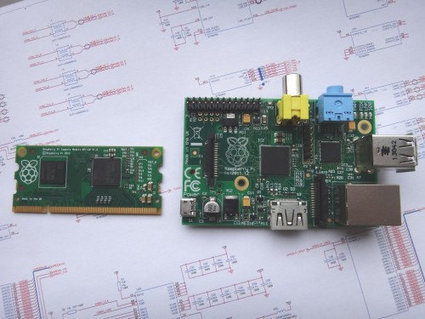Alex Eames has just published an update for HDMIPi, the affordable high-definition screen for the Pi. In it, he reports receipt of the latest version of the screen driver board and explains some of the tests he’s run on it. He’s also done a video of the board in action so we can all whet our appetites.
National Museum of Computing features #RaspberryPi / FUZE

Just been contacted by the FUZE team with a press release (it’s the first time I’ve been sent a press release!) so I thought I’d share the news.
The National Museum of Computing lights the FUZE at Bletchley Park
The National Museum of Computing (TNMOC) located in Bletchley Park, has announced their plans to include the FUZE in their Easter Bytes half term activities.
Following the highly successful Summer Bytes and Christmas Bytes of 2013, the Easter Bytes activities will run from 10th to the 21st April 2014, and the FUZE will be part of the activities on offer.
“We are extremely proud to support The National Museum of Computing at Bletchley Park”, stated Jon Silvera, Managing Director of Binary Distribution. “It showcases an incredibly impressive array of computing history, and we are proud to say the FUZE is now in use and included in the museum line-up permanently, alongside the showcase at the Easter Bytes sessions.”
The exclusive version of FUZE BASIC customised for the Raspberry Pi will be available for use at TNMOC and also available to buy in the TNMOC shop.
Lin Jones, Operations Manager at TNMOC, said: “We think our visitors are going to have a lot of fun with the FUZE units that are now ready for use in the classroom area of the museum alongside the very popular BBC micros. Like those BBC micros of the 1980s, FUZE devices are accessible, affordable and ideal for anyone who wants to try their hand at computer programming — something that so many of our visitors want to do having been inspired by the historic computers on display throughout the Museum. We are delighted to be able to introduce a new generation to the joy of coding!”
Whilst not just applicable to education, the FUZE has often been quoted as harnessing the full educational potential of the Raspberry Pi. The FUZE brings to life all key stages of the ICT curriculum in a fun, motivational and engaging package and provides the perfect platform for the classroom, after school clubs and bedroom coders.
Its robust design makes the FUZE more than a match for the rigours of everyday school life (not to mention protecting against static and shorting), and its flexible configuration options allow existing Raspberry Pi owners to make the most of their investment.
An interactive electronic kit is included to develop programming skills and an understanding of practical applications of technology in the real world.
The simple and engaging project framework not only gets users interested, it keeps them interested.
The FUZE BASIC programming language has been exclusively adapted to support the Pi and its electronic Input/Output features. Coupled with the included project cards, the FUZE is an ideal platform to teach and learn computer programming and electronics at all levels.
The National Museum of Computing, located on Bletchley Park, is an independent charity housing the world’s largest collection of functional historic computers, including the rebuilt Colossus, the world’s first electronic computer, and the WITCH, the world’s oldest working digital computer. The Museum enables visitors to follow the development of computing from the ultra-secret pioneering efforts of the 1940s through the large systems and mainframes of the 1950s, 60s and 70s, and the rise of personal computing in the 1980s and beyond.
You can read a review of the FUZE on the TNMOC site.
Picademy – #RaspberryPi Foundation course write-up

Lenny Dutton has just completed the first Picademy course run by the Raspberry Pi Foundation at their Cambridge headquarters. She’s written extensively about the experience on her blog. Very good reading for those who are interested in the steps the Foundation is taking to spread the word amongst educators. Read it here
Basically, I will use any excuse I have to show a picture of Babbage 🙂
Using the Pi-LITEr board with the #RaspberryPi

The ‘Average Man’ has got hold of a Pi-LITEr board from Ciseco. These tiny boards feature a row of bright surface-mounted LEDs and plug directly into the GPIO. It’s really good for teaching yourself about GPIO and you could make, for example, a really nice night-light out of it. He’s included some code examples to get you going and you should have fun if you decide to get one. (Plus they’re really cheap!). Read Average Man’s blog post about it. You can get hold of a PiLITEr from Ciseco here for £3.
Home automation with a #RaspberryPi and an #Arduino

Lauren Orsini has done a lovely round-up of all kinds of options for home automation using both the Pi and the Arduino. It’s basically a collection of links to other articles but the piece has been put together really well and is well worth a scan through! Read it here.
#RaspberryPi Compute Module – an insider interview
Matt Manning was recently at the Raspberry Pi Foundation giving a presentation on the Pi Community to the assembled educators. While he was there he interviewed James Adams, the Foundation’s director of hardware, about the Compute Module. This is a great interview as it clears up a little bit of the reasoning behind the module and the expected uses for it. The Compute Module will be around $30. The development I/O board will be considerably more than that and more in line with other development boards that currently exist for other platforms. Watch the interview here.


